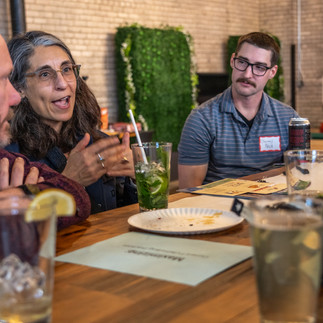Idea Jam 3 - Small Sums
- Matt Pacyga

- Feb 21, 2024
- 5 min read
Updated: Nov 29, 2024
Season 1 - Idea Jam 3
Spotlight Business: Small Sums https://www.smallsums.org/

Problem Statement:
Small Sums, a Minnesota-based nonprofit aiding workers experiencing homelessness, confronts a multifaceted challenge. Primarily, they face a critical supply chain issue in procuring work gear (clothing, boots, tools) due to limited buying power and rising costs, which impacts their model's sustainability and hinders expansion goals.
[Secondary - which could be the primary focus for Innovate MN] Concurrently, Small Sums seeks innovative strategies to enhance fundraising efforts and community engagement, with an upcoming fashion show presenting a timely opportunity.
Event Pictures
Event Deck
Summary
This explanation contains the idea jam framework generated by facilitators Jim Cuene, Jonell Pacyga, and Garrick Van Buren based on the information provided by Andrea (Small Sums) and Matt Pacyga (Innovate MN):
Small Sums approached the opportunity to collaborate with the Innovate MN community with a focus on ideating on two challenge areas for the organization: a) product supply issues (i.e., paying full retail pricing for items distributed), and b) resourcing and expanding funding solutions.
The Innovate MN facilitator team discussed possible ways to put these issues before the Innovate community, leading to open ideation and brainstorming without preconceived ideas. For example, the broader question of how Small Sums could lower the cost of gear provided to their clients opens up the ideation to things such as supply chain relationships (i.e. seeking partnerships for product "seconds", overstock, etc.) to promotions (Tom's shoes "buy 1, give 1" model), true partnerships (i.e. "for every purchase of this product, $1 is donated to Small Sums"), crowdsourced purchases, etc. However, simply asking, "How could Small Sums alleviate supply chain issues?" would have likely only led to solutions focused on that one facet of a broader challenge area for the organization. With that in mind, the challenge of "What can Small Sums do to maximize their impact?" was selected as a broad base for ideation. It could contain distinct yet interrelated challenge areas for the organization (product supply and expanding funding solutions).
At the Innovate MN event, Small Sums provided an overview of the organization to the Innovate community. The "maximizing impact" challenge was then broken down further into four more specific areas for iterative ideation by participants: 1)Expanding: Collaborations and Partnerships, 2) Extending: Purchasing Power, 3) Maximizing: Current Fundraising Practices, and 4) Innovating: Organizational Self-Sustainment. Each of these four is explained in the following paragraphs, along with an example solution for reference:
1) "Expanding Collaborations and Partnerships" are ideas of collaborators that may unlock further potential for the Small Sums organizations. For example, since some corporations partner only with a non-profit for a specific amount of time (i.e. one to two years), Small Sums could build a larger repertoire of repeating corporate partners, such as Redwing Shoes, to always have a sponsoring organization each year since updating partnerships are continually needed.
2) "Extending Purchasing Power" is an idea that lowers the cost of purchase or procurement of the products needed by small sums. While some services and products provided by the organization are already at the optimal product purchase price (i.e. Metro bus passes at 50% off retail price), other products that Small Sums needs are purchased at full retail cost (i.e. through Amazon or other retailer). Solutions here include things like how Small Sums could lower its cost of securing product items, such as buying in bulk at a lower cost after finding an organization that would be willing to donate storage space in partnership/collaboration.
3) "Maximizing Current Fundraising Practices" are ideas that build on the current non-profit resource funding model currently used by Small Sums. Small Sums presently relies on fundraising events (such as the upcoming Fashion Show) with individual and organizational donors and grant funds (when available). Solutions here might include leveraging social media influence marketing with a focus on the branding of "Small Sums" to highlight the impact of small donations and other event or community ideas related to the experiences of all stakeholders.
4) "Innovating Organizational Self-Sustainment" is an idea that seeks to alleviate or find incremental solutions for the ever-present fundraising needs of non-profit organizations. These solutions strategically position the organization to fund all or part of its operating costs by alternative or additional means (different from current fundraising-dependent strategies). An example solution here may include an idea such as buying t-shirts in bulk, then screen-printing half to sell through an online shop to donors in a solution that lets a quarter of the bulk t-shirt order potentially pay for the t-shirts of the bulk order, which are used for client needs.
Lastly, though these four idea areas are powerful on their own, maximizing the impact of Small Sums likely entails connecting ideas across these four brainstorming areas. For example, finding a partner organization to help via space donation may enable Small Sums to be able to purchase multiple gear items in bulk or as "seconds" directly from corporations, and leveraging these solutions together may lead to the capacity to take action in another area.
AI Analysis
The integrated solutions and themes from the brainstorming session for Small Sums, considering the areas of Expanding, Extending, Maximizing, and Innovating, suggest a cohesive strategy to enhance the organization's capacity to serve its clients more effectively and sustainably. Here's an overview of how these themes integrate across the brainstorming areas:
Integrated Themes:
Sustainability and Self-Sufficiency: Across all areas, there's a strong emphasis on creating a sustainable model that allows Small Sums to be less dependent on variable fundraising activities and more on stable, self-generated resources.
Community and Corporate Partnerships: The importance of building and maintaining partnerships is a recurring theme. These relationships are not just for immediate benefits like donations or discounts but for long-term collaborations that offer mutual value.
Innovative Resource Management: Whether through extending purchasing power or innovating for self-sustainment, there's a clear focus on managing resources more creatively and efficiently. This includes bulk purchasing, negotiating for overstock items, and leveraging donated services or space.
Engagement and Awareness: Maximizing fundraising practices and expanding collaborations both point to the necessity of engaging the community and raising awareness about Small Sums' mission. This engagement is not only for fundraising but also for mobilizing volunteers, securing donations, and building brand loyalty.
Integrated Solutions:
Rotational Partnership Model: Develop a system where corporate and community partnerships rotate in a structured manner, ensuring a continuous stream of support while offering fresh engagement opportunities for new and existing partners.
Bulk Purchase and Storage Collaboration: Work with partners to secure storage space for bulk purchased or donated items. This strategy reduces costs and ensures a steady supply of necessary goods, directly addressing the product supply issues.
Brand and Impact Marketing: Utilize social media and other digital platforms to highlight the impact of contributions, leveraging storytelling to connect with potential donors and partners on an emotional level. This approach can enhance the visibility of fundraising events and campaigns.
Merchandise for Sustainability: Create a line of branded merchandise that serves dual purposes: generating revenue for the organization and increasing brand visibility. This initiative can also engage supporters in a new way, offering them tangible goods that promote Small Sums' mission.
Integrated Event Strategy: Organize fundraising events that serve as partnership networking opportunities, volunteer recruitment platforms, and awareness-raising occasions. These events can maximize the impact by integrating various organizational goals.
Technology and Innovation for Efficiency: Adopt technological solutions for more efficient management of donations, volunteers, and resources. This can include a database for tracking and matching skillsets for volunteer opportunities, as well as inventory management systems for donated goods.




















































Comments